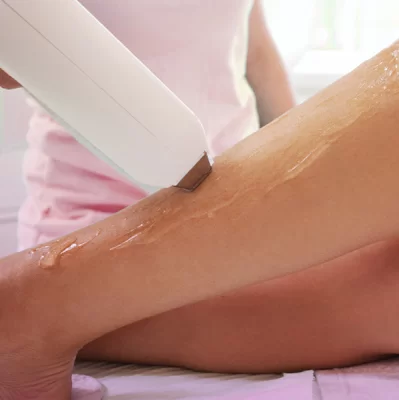Does laser hair removal hurt?
- Does laser hair removal hurt?
- What are the feelings associated with laser hair removal treatment?
- What does the level of pain during laser hair removal depend on?
- How does modern laser technology affect the comfort of the procedure?
- How can one reduce pain and discomfort during a procedure?
- Does laser hair removal cause more pain than waxing or using a depilatory?
- How to properly care for the skin after laser hair removal?
The sensations during laser hair removal are very individual and depend on the pain threshold of each person. Most clients experience only slight discomfort, not strong pain. Thanks to modern technologies, the intensity of these sensations is significantly reduced. Any discomfort is short-lived and disappears immediately after the laser pulse. Furthermore, compared to other methods such as waxing, laser hair removal is often considered much less painful over the course of the whole treatment series.
The sensations during laser hair removal are very individual, but usually they amount to slight discomfort. Patients most commonly feel:
- gentle pricks,
- tinkling,
- burning,
- pleasant warmth,
- sensations comparable to a quick snap of a rubber band.
These brief, intense sensations are the result of selective photothermolysis. The laser beam precisely targets melanin – the pigment present in the hair. The absorbed energy damages the hair follicle, effectively inhibiting its further growth.
Laser hair removal is usually not very painful, although the level of discomfort can depend on several key factors.
The most sensitive areas are typically the intimate zones (such as the bikini area), armpits, and upper lip. Pain is less noticeable on the legs, arms, or stomach. The type and color of hair are also significant - darker, coarser hair during laser hair removal can cause more pain, especially on lighter skin tones. Sensations during the treatment are also influenced by the hair growth phase, density, overall condition, and sensitivity of the skin. For women, the menstrual cycle phase is also significant.
Modern lasers significantly help in reducing discomfort during procedures. These devices, including diode and alexandrite lasers, are equipped with advanced cooling systems. Thanks to this, they effectively cool the skin before, during, and after the procedure, not only minimizing unpleasant sensations but also protecting the epidermis from overheating. In addition, an experienced specialist precisely selects the laser parameters, such as wavelength, always taking into account the individual characteristics of the patient. This is essential to ensure both safety and optimal effectiveness of hair removal, which translates into the comfort of the entire procedure.
Do you want laser hair removal to be comfortable and less painful? The key is proper preparation for the procedure.
Before the treatment, remember to:
- thoroughly shave the areas to be depilated,
- avoid sunbathing (both in the sun and at the solarium),
- avoid chemical peels,
- avoid self-tanners,
- discontinue any herbs and medications with photosensitizing effects, such as retinoids or certain antibiotics.
If you have particularly sensitive skin, the specialist may apply a special numbing cream that will significantly increase your comfort during depilation. Remember to relax before the procedure and trust your cosmetologist.
Laser hair removal significantly differs from traditional methods of hair removal. While waxing or using an epilator often involve intense, and even continuous, pain caused by mechanically pulling out hair, lasers work completely differently. During a laser treatment, you only feel short, pinpoint sensations, which can be compared to gentle flicks. Furthermore, this advanced technology effectively eliminates the problem of painful, ingrown hairs, providing long-lasting comfort and perfectly smooth skin.
After laser hair removal, the skin may be red and slightly swollen. These are completely normal symptoms that usually subside after a few hours. Proper skin care is necessary after the procedure. Regularly moisturize the irritated skin using soothing products. Creams with aloe vera, allantoin, or panthenol work great. Additionally, avoid sun exposure at all costs. Always use creams with very high UVA and UVB protection. This will help reduce irritation and allow you to enjoy long-lasting smooth skin.
